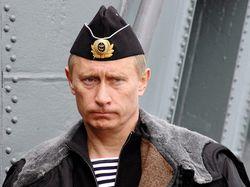It's a full court Putin press:
When the White House discovered in recent weeks that its unclassified computer systems had been breached, intelligence officials examined the digital evidence and focused on a prime suspect: Russia, which they believe is using its highly sophisticated cyber capabilities to test American defenses. But its tracks were well covered, and officials say they may never know for sure.
They have no doubt, however, about what happened this week on the edges of NATO territory in Europe.
More than two dozen Russian aircraft, including four Tu-95 strategic bombers, flew through the Baltic and Black Seas, along the coast of Norway and all the way to Portugal, staying over international waters but prompting NATO forces to send up intercepting aircraft.
Taken together, they represent the old and the updated techniques of Cold War signal-sending. In the Soviet era, both sides probed each other’s defenses, hoping to learn something from the reaction those tests of will created. In 2014, cyber is the new weapon, one that can be used with less restraint, and because its creators believe they cannot be traced and can create a bit of havoc without prompting a response.
In this case, the response was that the White House shut down use of some of its networks for lengthy periods — more an inconvenience than anything else, but a sign of the fragility of the system to sophisticated attacks.
But in both, divining the motive of the probes and the advantage, if any, they created is far from easy.
The Russian aircraft exercises were part of a broader escalation: NATO has conducted more than 100 intercepts of Russian aircraft this year, its officials report, far more than last year, before Russia annexed Crimea and began its operations in Ukraine.
“This is message-sending by Putin, and it’s dangerous,” one senior defense official said Wednesday, noting that in many cases, the Russian aircraft had turned off their transponders and did not reply to radio calls to identify themselves. In response, Germany, Portugal, Turkey and Denmark sent aircraft aloft, along with two non-NATO nations, Finland and Sweden. They were particularly struck by the use of the Tu-95 bombers, which Russia usually keeps clear of Europe.
But what’s new is the sophistication of Russia’s cyberespionage campaigns, which differ somewhat from China’s. The Chinese attacks — like those led by Unit 61398 of the People’s Liberation Army, whose members were indicted earlier this year by the Justice Department — are aimed chiefly at intellectual property theft. The Russians do a bit of that, too, but the attacks also suggest more disruptive motives.
More at the link.
I ask again here what I asked yesterday:
What might be leading the Russians to think they can get away with these provocative acts? Why might they doing this? Who might in the end be responsible for giving the impression that there's no priceto pay for this sort of thing?
Questions I'd like to see the media ask the President of the United States directly.
Obama's weakness is being exploited. To what end?
 More than two dozen Russian aircraft, including four Tu-95 strategic bombers, flew through the Baltic and Black Seas, along the coast of Norway and all the way to Portugal, staying over international waters but prompting NATO forces to send up intercepting aircraft.
More than two dozen Russian aircraft, including four Tu-95 strategic bombers, flew through the Baltic and Black Seas, along the coast of Norway and all the way to Portugal, staying over international waters but prompting NATO forces to send up intercepting aircraft.